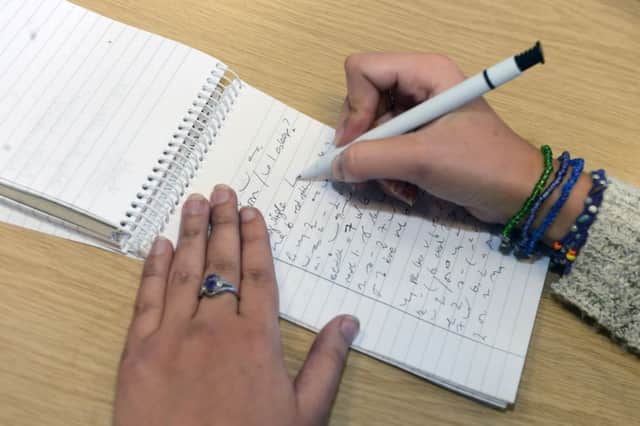Don’t let bullies get you down


That is the message from Bedfordshire Police during the National Anti-Bullying Week being held between November 17 and 21.
During the week of action, officers and staff will be visiting schools and other educational establishments around the county to discuss the issue of cyber bullying with children, young people, parents and guardians.
Advertisement
Hide AdAdvertisement
Hide AdRichard Denton, Children and Young People Development Officer and Schools Co-
ordinator, said: “Bullying was once confined to the playground but in its new online form, cyber bullying can be carried out through social media sites, texts, websites or instant messaging. It can present itself in upsetting or threatening messages, rumours or embarrassing photos or videos posted online. Because young people access these channels 24/7 the victim can often feel there is no escape.
“Young People who have never bullied anyone in real life could be drawn into cyber bullying because they think they are anonymous. They may do or say things they wouldn’t ever face-to-face because they’re hiding behind a screen’
“As part of our ongoing education programme over 55,000 children and young people across the county have already had an input from Bedfordshire Police about staying safe online which has included a specific element on cyber bullying. We have also focused a lot of our work speaking to parents, guardians and professionals who work with children and young people about this issue by running a number of specific events aimed at them.”
Advertisement
Hide AdAdvertisement
Hide AdRichard added: “When we go into schools and other educational establishments a number of students we talk to often tell us that they have personally witnessed
bullying online but only a small number say they did anything about it. Young People should always report anything abusive they see online to the site concerned.
“We also advise children and young people across Bedfordshire that if they are being bullied online to save and print out any nasty messages or pictures noting dates and times, block the person doing it and speak to a trusted adult as quickly as
possible.
“Our education input also gives us an opportunity to highlight the law around cyber-crime as lots of young people may not realise that a number of UK laws do cover the issue of bullying for example, harassment or threatening behaviour, and particularly relevant for cyber bullying – threatening and menacing communications.”
Advertisement
Hide AdAdvertisement
Hide AdDuring the week advice and information about cyber bullying will also feature on the forces children and young people official twitter account @YouthBedsPoliceCyber bullying
Cyber bullying
Cyber bullying is when someone uses the internet or mobiles to deliberately upset someone else. This is a form of bullying and you shouldn’t have to put up with it.
How is it different to normal bullying?
Technologies such as mobile phones and the internet mean that young people can be targeted by bullies in their own homes. These technologies also mean that it can sometimes be difficult to track the bully. They can hide their number or post things online anonymously. The nature of this type of bullying means it can have a large audience, many of whom may not realise they are being bullies.
However there are some positives with cyber bullying, it can be evidenced. Normal bullying is normally one person’s word against another’s. If you are being cyber bullied you can save texts or print out emails/ IM’s/ Web Pages. This can be used as proof to catch the bully and can stop them upsetting you or anyone else.
What can I do if I am being cyber bullied?
• Speak to a trusted adult as quickly as possible.
Advertisement
Hide AdAdvertisement
Hide Ad• Save all evidence you have of the bullying. If you have nasty emails or things posted on your profile save them to your machine so you can use it as proof.
Save texts or voicemails that say anything horrible. Learn how to block the bully on IM or delete them from your contacts.
• Try not to reply or retaliate to things they say or do; it might make the situation worse. If you don’t respond, they are more likely to get bored and move on.
• If you are being bothered via text, contact your service provider. Each network has a special area for this sort of problem. Check out their website or call them for advice or a free number change.
What should I do if someone else is being cyber bullied?
Advertisement
Hide AdAdvertisement
Hide Ad• If you know someone that is being cyber bullied or have seen nasty profiles or messages going around, it is your duty to report it. Cyber bullying is really scary for the person being bullied as the audience can be huge, loads of people could be seeing the mean things that have been said and done. If you see anything that looks like cyber bullying, it is your duty to report it. Tell an adult you trust about what is going on and they will be able to help offer support to the person who is being bullied.
• Don’t participate in forwarding pictures, messages or insults about a person.
You may think it is a joke, but you could be really upsetting the person involved and even committing a crime. To look at or forward this sort of stuff means you are contributing to cyber bullying.
• Standing back and letting it happen can be just as bad. If you are worried that someone is getting threatened or hurt by others, offer them support or inform an adult you trust so they can help make it stop.
Always respect other people and be aware of what you’re sending and receiving whilst online.